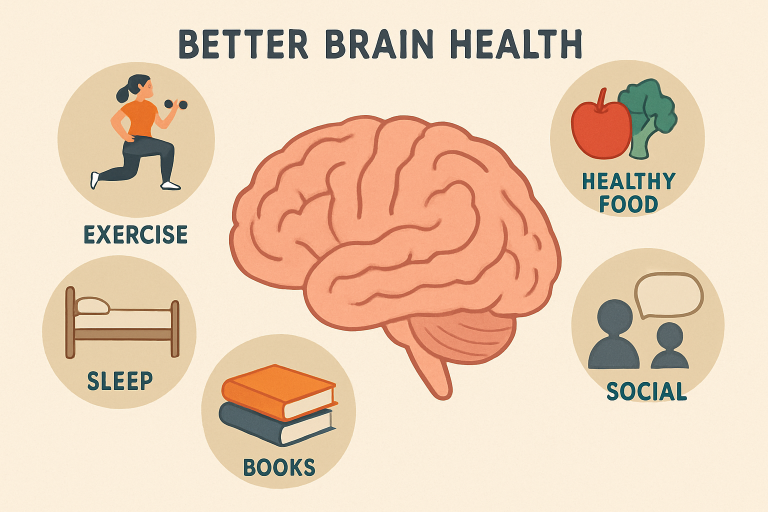Key Takeaways
- Building daily movement and exercise into your routine improves cognitive function.
- A diet high in whole foods, antioxidants, and healthy fats protects brain health.
- Challenging your mind daily strengthens neural pathways.
- Consistent, high-quality sleep is essential for mental rejuvenation.
- Meaningful social connections nourish emotional and cognitive well-being.
Table of Contents
- Introduction
- Engage in Regular Physical Activity
- Maintain a Balanced Diet
- Participate in Mental Exercises
- Prioritize Quality Sleep
- Foster Social Interactions
- Implement Stress Management Techniques
- Avoid Harmful Substances
- Schedule Regular Health Check-ups
Brain health is fundamental to maintaining cognitive vitality and overall well-being as we age. By integrating evidence-based daily habits into our routines, we can significantly improve mental sharpness, memory, and resilience to cognitive decline. Consulting neurologists or brain health professionals can also provide tailored guidance for long-term cognitive health. Incorporating these core practices doesn’t just boost brain function for today—it also lays the foundation for a healthy mind in later years. Understanding and acting on the best strategies to care for our brains is key to unlocking lifelong learning, clarity, and emotional stability.
Engage in Regular Physical Activity
Physical activity remains one of the most dependable ways to bolster brain health at any age. Engaging in moderate exercises like brisk walking, cycling, or swimming for at least 30 minutes a day has been shown to increase blood flow to the brain, reduce inflammation, and trigger growth factors necessary for learning and memory. Strength training several times weekly further enhances cognitive function and brain plasticity, helping to prevent age-related decline. Research published in Harvard Health supports the positive effect of regular exercise on memory and executive function.
Maintain a Balanced Diet
A nourishing diet has a direct impact on brain structure and function. The MIND diet—an amalgamation of Mediterranean and DASH eating patterns—emphasizes leafy green vegetables, whole grains, berries, fish, nuts, and the use of olive oil. These nutrient-rich foods, rich in antioxidants and healthy fats, help reduce oxidative stress and inflammation, two key drivers of cognitive impairment. Limiting processed foods and added sugars is equally important to minimize risk factors associated with dementia and other neurodegenerative diseases.
Participate in Mental Exercises
Just as our bodies benefit from regular physical activity, our brains require mental stimulation to stay sharp. Activities that challenge intellect and coordination—like reading, writing, solving riddles, or learning a new language—strengthen neural connections. Creative pastimes, such as painting or learning a musical instrument, foster neuroplasticity by building new pathways and enhancing cognitive reserve. Even dancing, which pairs movement with concentration and rhythm, activates multiple brain areas and is associated with a reduced risk of dementia.
Prioritize Quality Sleep
Restful sleep is essential for both memory and mood. Adults need at least seven hours of restorative sleep each night for effective memory consolidation and the removal of neurotoxins that build up during waking hours. Chronic sleep deprivation hampers attention, learning, and judgment, and also raises the risk of neurodegenerative diseases. To improve sleep, maintain a consistent bedtime routine, reduce screen time in the evening, and create a calming environment free of interruptions. Improving sleep hygiene is vital for brain health.
Foster Social Interactions
Strong social networks protect against cognitive decline and boost both emotional and brain health. Participating in regular conversations, joining clubs, or volunteering helps preserve mental agility and lowers feelings of isolation or depression. These relationships provide mental stimulation and foster a sense of belonging, which are essential for a resilient mind. Social activities improve cognitive functions, like memory and problem-solving.
Implement Stress Management Techniques
Prolonged stress is toxic to the brain, raising cortisol levels that impair memory and learning. Adopting daily stress-relief practices, such as deep breathing, meditation, tai chi, or mindfulness-based yoga, has been proven to regulate mood, improve sleep, and preserve brain tissue. These mind-body techniques support optimal function and combat the effects of chronic stress by promoting relaxation and improving emotional regulation.
Avoid Harmful Substances
Avoiding smoking and limiting alcohol consumption are essential for long-term brain health. Both heavy drinking and tobacco use are strongly associated with a higher risk of stroke, dementia, and other neurodegenerative diseases. Emphasizing a healthy lifestyle free of these substances is crucial for preserving brain function.
Schedule Regular Health Check-ups
Regularly monitoring health markers such as blood pressure, blood sugar, and cholesterol is essential for detecting and managing chronic illnesses that can harm brain function. Timely intervention and treatment of these underlying conditions help reduce inflammation and vascular risk—key strategies in staving off cognitive decline. Annual visits with your healthcare provider support early diagnosis and comprehensive management for lifelong brain wellness.
Integrating these science-backed habits into your daily routine not only enhances your cognitive capabilities but also establishes a robust defense against memory loss and mental decline. Consistency and ongoing commitment to these practices are essential for optimizing your brain’s potential throughout life.

